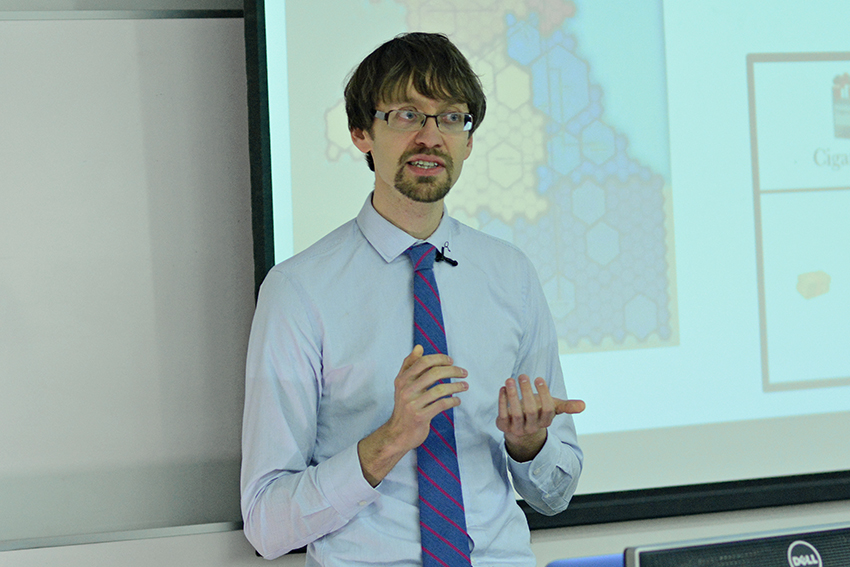Video games have evolved past traditional shoot-em-ups to immersive experiences that teach empathy and open mindedness.
Patrick Jagoda, English, cinema and media studies associate professor from the University of Chicago, spoke about merging gaming and medical humanities last Friday. The talk was hosted by the Texas Institute for Literary and Textual Studies.
Jagoda builds games designed to help change attitudes about healthcare through his company, Game Changer Chicago Design Lab. He co-founded the lab with University of Chicago professor Melissa Gilliam to produce video games that focus on health and social issues.
“This is exactly what is interesting about gaming — the coming together of science and technology on one hand and humanistic and artistic thought on the other,” Jagoda said.
Gamification, the use of game mechanics in traditionally non-game activities such as business, psychology and design, has spread into public use with apps such as Nike+. Jagoda said while gamification can be sometimes reduce important things in our life to mere check-boxes, video games can be used for good.
One example he gave was “The Test”, a video game promoting HIV testing among African-American gay men, which may help facilitate open attitudes towards healthcare.
Jagoda said focusing on narration and character-building helps create games that touch on serious social and educational issues. This new model of video games, the serious games movement, is both expanding and diversifying.
“There’s no universal audience for games now. Now the average age of gamers is 37,” Jagoda said. “It’s very diverse compared to the white, affluent adolescent boys of the 1980s.”
Jagoda exposes gamers to important issues using the process of embedded learning, which works by planting subtle lessons throughout the game. According to Jagoda, video games are more effective at teaching lessons if they direct the audience’s attention through methods such as narration or satire.
For instance, the Game Changer Design Lab designed the video game, Smokestacks, to promote a message of anti-smoking by having the gamer play from the perspective of a tobacco company.
“How do you make a game that is capable of changing attitudes and behaviors about serious topics?” Jagoda asked. “You don’t want to make something that’s reductive or manipulative, but you don’t want to (make) something that’s (so) educational that players tune out.”
Jagoda has also worked on alternate reality games promoting STEM education for women and underrepresented populations and is working on a game that would teach youth how to identify and intervene in sexual violence scenarios.
Brian Bremen, co-director of the Texas Institute for Literary and Textual Studies, said the institute chose the theme of Health, Medicine, and the Humanities in order to celebration of the new Dell Medical School. He said the year-long program has focused on how the humanities affect change in modern healthcare.
“Especially with a too-narrow focus on STEM issues, you lose sight of how the humanities work together with the sciences to provide a complete view of treating people and issues within medicine itself,” Bremen said.
Plan II and biology sophomore Amy Ong said she attended the talk because she didn’t really know much about gaming and was curious about its application. She said she left with a better understanding of the evolution of gaming and its diverse nature.
“I really loved the idea of how interactive, educational, and inclusive gaming can be,” Ong said. “The average gamer is 37 years old and likely a woman; that’s pretty incredible.”















